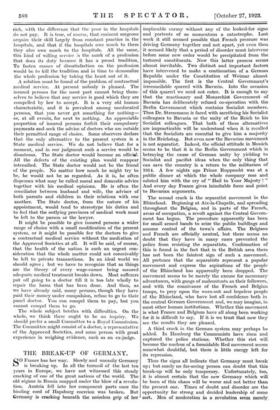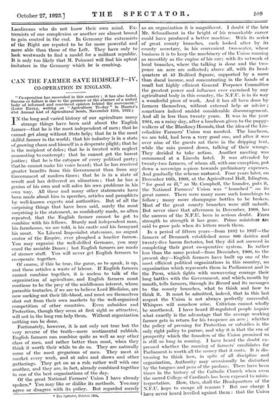THE BREAK - UP OF GERMANY.
SO France has her way. Slowly and uneasily Germany is breaking up. In all the turmoil of the last ten years in Europe, we have not witnessed this steady cracking of one of the great nations of the world. The old regime in Russia snapped under the blow of a revolu- tion. Austria fell into her component parts once the binding cord of Hapsburg coercion was broken. But Germany is cracking beneath the noiseless grip of her implacable enemy without any of the looked-for signs and portents of so momentous a catastrophe. Last week it still seemed possible that French pressure was driving Germany together and not apart, yet even then it seemed likely that a period of disorder must intervene before some new order would be precipitated from the tortured constituents. Now this latter process seems almost inevitable. Two distinct and important factors have intervened to make a continuation of a German Republic under the Constitution of Weimar almost impossible. The first is the Central Government's irreconcilable quarrel with Bavaria. Into the occasion of this quarrel we need not enter. It is enough to say that the reactionary and Monarchist Government of Bavaria has deliberately refused co-operation with the Berlin Government which contains Socialist members. Thus Dr. Stresemann is faced with sacrificing his Socialist colleagues to Bavaria or the unity of the Reich to his Socialist colleagues. That both of these alternatives are impracticable will be understood when it is recalled that the Socialists are essential to give him a majority in the Reichstag. But even now the Bavarian movement is not separatist. Indeed, the official attitude in Munich seems to be that it is the Berlin Government which is betraying the cause of German unity by yielding to Socialist and pacifist ideas when the only thing that can save the country is a return to the militarism of 1914. A few nights ago Prince Rupprecht was at a public dinner at which the whole company rose and saluted him with the cry of " Hail to Your Majesty ! " And every day France gives inimitable force and point to Bavarian arguments.
The second crack is the separatist movement in the Rhineland. Beginning at Aix-la-Chapelle, and spreading throughout the Belgian, and in parts of the French, areas of occupation, a revolt against the Central Govern- ment has begun. The procedure apparently has been for small armed bands to seize the public buildings and assume control of the town's affairs. The Belgians and French are officially neutral, but there seems no doubt that they have in many cases prevented the police from resisting the separatists. Confirmation of this is found in the fact that in the British area there has not been the faintest sign of such a movement. All pretence that the separatists represent a popular movement and express the aspirations of the people of the Rhineland has apparently been dropped. The movement seems to be merely the excuse for mercenary adventurers, with gangs of malcontents as their followers, and with the connivance of the French and Belgian troops, to prey upon the worn-out and hopeless people of the Rhineland, who have lost all confidence both in the central German Government and, we may imagine, in most other human institutions. Whether this movement is what France and Belgium have all along been working for it is difficult to say. If it is we trust that now they see the results they are pleased.
A third crack in the German system may perhaps be added. In Hamburg the Communists have risen and captured the police stations. Whether this riot will become the nucleus of a formidable Red movement seems somewhat doubtful, but there is little energy left for its repression.
Thus the signs all indicate that Germany must break up; but surely no far-seeing person can doubt that this break-up will be only temporary. Unfortunately, too, it is almost certain that the new Germany which will be born of this chaos will be worse and not better than the present one. Times of doubt and disorder are the opportunity for strong and decided leadership of some sort. Men of moderation in a revolution seem merely, Laodiceans who do not know their own mind. Ex- tremists of one complexion or another are almost bound to gain control in the end. In Germany the extremists of the Right are reputed to be far more powerful and more able than those of the Left. They have only to • look westwards to find a model for a militant republic. It is only too likely that M. Poincare will find his aptest imitators in the Germany which he is crushing.















































 Previous page
Previous page